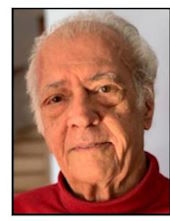© 2023 Jean Lapierre
© 2023 Urantia Association of Quebec

Jean Lapierre
Bromont
Hello everyone,
The booklet that we will soon finish studying [booklet 140] is in my opinion one of the most misunderstood of the revelations. In the same way that Michael received advice from Emmanuel surrounding his last outpouring, the apostles also receive advice from Jesus. This advice even goes so far as to be instructions to follow in order to be his ambassadors on earth and not simply disciples.
As we have seen, Jesus asks them to act and behave as he himself behaves or would behave. This does not mean, moreover, that his other disciples could not also try to follow part or all of this advice (also ourselves). Let us not forget that Emmanuel had told Michael that his life on earth should be an inspiration for us (also for his whole universe) and not an example to follow. Jesus asks his Father to accompany them as he himself was. This booklet contains little or no teaching from the new gospel: the emphasis is on practical instructions that his twelve apostles had to follow absolutely. Another piece of advice from Emmanuel was: UB 120:3.6 “ _5. “To the extent that you deem it expedient, you must assimilate yourself into the religious and spiritual movements existing on Urantia, but seek in every way possible to avoid the formal establishment of an organized cult, a crystallized religion, or a separate ethical grouping of human beings. Your life and teachings must become the common heritage of all religions and all peoples.”

We understand why Jesus when he ordained his twelve apostles, he did not ask them to perpetuate replacement ambassadors after them (no creation of a new religion): the emphasis is on personal religion. Shortly before leaving them Jesus informed his apostles that he will send his Spirit of Truth who will become the new instructor who will be available to everyone and to all generations. This instructor will allow each generation to always reinterpret his message with greater accuracy. He said: I am the way, the truth and the life.
To conclude we realize that this ordination and consecration to the twelve was so important that the morontial Jesus reproduced this scene during his fourteenth appearance on the mount of ordination and there again before his entire universe.
(Editor’s note) The next day, Éric Martel sent the group a series of quotes supporting Jean’s comments!
Thank you Jean,
To add a little more…
Jesus chose to establish the kingdom of heaven in the hearts of mankind by natural, ordinary, difficult, and trying methods, just such procedures as his earth children must subsequently follow in their work of enlarging and extending that heavenly kingdom. For well did the Son of Man know that it would be “through much tribulation that many of the children of all ages would enter into the kingdom.” Jesus was now passing through the great test of civilized man, to have power and steadfastly refuse to use it for purely selfish or personal purposes. (UB 136:8.6)
In your consideration of the life and experience of the Son of Man, it should be ever borne in mind that the Son of God was incarnate in the mind of a first-century human being, not in the mind of a twentieth-century or other-century mortal. By this we mean to convey the idea that the human endowments of Jesus were of natural acquirement. He was the product of the hereditary and environmental factors of his time, plus the influence of his training and education. His humanity was genuine, natural, wholly derived from the antecedents of, and fostered by, the actual intellectual status and social and economic conditions of that day and generation. While in the experience of this God-man there was always the possibility that the divine mind would transcend the human intellect, nonetheless, when, and as, his human mind functioned, it did perform as would a true mortal mind under the conditions of the human environment of that day. (UB 136:8.7)
And this was his true and supreme purpose. He did not come down to live on Urantia as the perfect and detailed example for any child or adult, any man or woman, in that age or any other. True it is, indeed, that in his full, rich, beautiful, and noble life we may all find much that is exquisitely exemplary, divinely inspiring, but this is because he lived a true and genuinely human life. Jesus did not live his life on earth in order to set an example for all other human beings to copy. He lived this life in the flesh by the same mercy ministry that you all may live your lives on earth; and as he lived his mortal life in his day and as he was, so did he thereby set the example for all of us thus to live our lives in our day and as we are. You may not aspire to live his life, but you can resolve to live your lives even as, and by the same means that, he lived his. Jesus may not be the technical and detailed example for all the mortals of all ages on all the realms of this local universe, but he is everlastingly the inspiration and guide of all Paradise pilgrims from the worlds of initial ascension up through a universe of universes and on through Havona to Paradise. Jesus is the new and living way from man to God, from the partial to the perfect, from the earthly to the heavenly, from time to eternity. (UB 129:4.7)